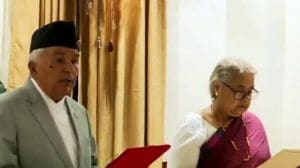Stay updated with the latest - Click here to follow us on Instagram
How can CJI be involved in executive appointments, asks Vice President, says it’s `time to revisit’
Such a procedure is not in consonance with democracy, he said, speaking at the National Judicial Academy, Bhopal.
 Vice President Jagdeep Dhankhar calls for revisiting norms on CJI's role in CBI director selection. (Source: PTI)
Vice President Jagdeep Dhankhar calls for revisiting norms on CJI's role in CBI director selection. (Source: PTI)Vice President Jagdeep Dhankhar on Friday wondered how the Chief Justice of India, even by “statutory prescription”, participate in the selection of the CBI director, and said it was time to “revisit” the norms.
Such a procedure is not in consonance with democracy, he said, speaking at the National Judicial Academy, Bhopal.
“To stir your minds, how can in a country like ours or in any democracy, by statutory prescription, Chief Justice of India participate in the selection of the CBI director?” Dhankhar said.
“Can there be any legal rationale for it? I can appreciate that the statutory prescription took shape because the Executive of the day has yielded to a judicial verdict. But time has come to revisit. This surely does not merge with democracy. How can we involve the Chief Justice of India with any executive appointment!” he said.
Referring to his stint as Parliamentary Affairs Minister in 1990, Dhankhar said the Supreme Court then had eight judges.
“More often than not, all the eight judges sat together (on a bench hearing a case)….When the strength of the Supreme Court was eight judges, under Article 145(3), there was a stipulation that interpretation of the Constitution will be by a bench of five judges or more,” he said.
“Please note, when this strength was eight, it (size of constitutional bench) was five. And the Constitution allows the highest court of the land to interpret the Constitution,” he added.
But under the guise of interpretation, there can be no “arrogation of authority”, and the essence and spirit which the founding fathers had in mind under Article 145(3) must be respected, the vice president further said.
“If I analyze arithmetically, they were very sure the interpretation will be by majority of judges, because the (total) strength then was eight. That five stands as it is. And the number (of total judges) is more than fourfold,” he added.
Article 145(3) of the Constitution of India states that at least five judges are required to sit on a case involving the interpretation of the Constitution.








